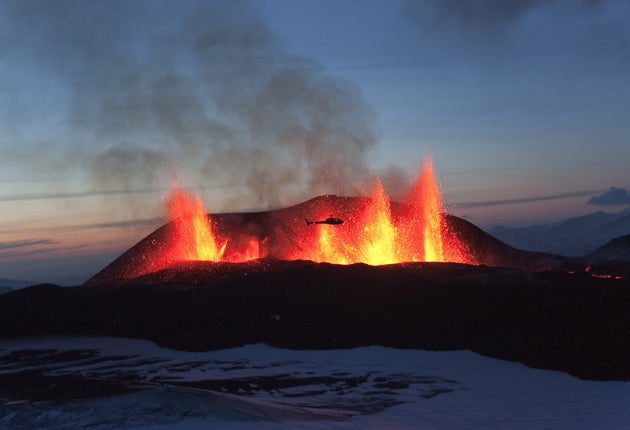Julian Knight: Insurers' stance is as clear as a cloud of volcanic ash

Your support helps us to tell the story
From reproductive rights to climate change to Big Tech, The Independent is on the ground when the story is developing. Whether it's investigating the financials of Elon Musk's pro-Trump PAC or producing our latest documentary, 'The A Word', which shines a light on the American women fighting for reproductive rights, we know how important it is to parse out the facts from the messaging.
At such a critical moment in US history, we need reporters on the ground. Your donation allows us to keep sending journalists to speak to both sides of the story.
The Independent is trusted by Americans across the entire political spectrum. And unlike many other quality news outlets, we choose not to lock Americans out of our reporting and analysis with paywalls. We believe quality journalism should be available to everyone, paid for by those who can afford it.
Your support makes all the difference.Have to hand it to those Icelandics, for an island with a population the size of Hull, they can't keep out of the news.
Not content with using billions of our savers' cash to fund their casino banking operations (and getting shirty when we have the temerity to ask for it back) their bilious volcano has grounded all our planes – not such a bad occurrence when you live on a flight path, like me. The response from insurers was, as ever, confused. One minute travellers are covered, another they're not. It's been reported widely that the volcanic eruption is classified as an Act of God (What happens, I wonder, if you're an atheist? Does "Act of God" not apply?) which means that travellers' losses are technically not covered.
Now, this is a bit of misnomer, because Act of God is a legal term – meaning events outside human control – and has nothing to do with insurance. There has never been an Act of God exclusion in insurance. Instead, they rely on the get out that only those events that are specifically mentioned in the policy are covered, and everything else – apart from events said to be excluded – is at the discretion of the insurer as to whether they pay out or not.
As a result, policyholders are left in limbo – whether or not something ends up being covered is often directly related to how much fuss the media kick up. With the Icelandic volcanic eruption it looks like most insurers are going to do the honourable thing (as they did with swine flu and the chaos at Heathrow Terminal 5) and pay up. But why is it that every time we see something out of the ordinary we have to go through this game of chicken with the insurance industry?
Instead of insurers having discretion, here's an idea. Policies should sum up the main points of what is covered – for travellers this would be stuff such as personal injury, medical treatment or luggage loss – and then they should list what definitely isn't. And any events which fall between the cracks, so to speak, should be covered automatically. In other words, take insurer discretion out and let consumers clearly see the circumstances where they will and won't be paid.
What a rotten business
Despite the sight of former Northern Rock deputy chief executive David Baker nearly in tears when apologising publicly after being fined half a million by the Financial Services Authority for mis-reporting the status of the Rock's loan book before the bank run in September 2007, there is no doubt that he and former credit director Richard Barclay got off lightly.
In the US, the Rock twosome would probably have faced trial and the prospect of years in jail. But Baker and Barclay aren't the only ones to blame. What about the executives who thought it was a bright idea to start offering the notorious Together mortgage at an LTV of 125 per cent? Their actions were really only the finishing touch on what was a thoroughly rotten business.
And what about the other rotten businesses? RBS, for instance. Will we see Fred the Shred Goodwin fined and banned by the FSA for managing the bust of the then world's biggest bank? What about HBOS, with its irresponsible lending practices, or Bradford & Bingley, which dived head-first into the murky sub-prime universe?
Then there are the building societies – Derbyshire, Cheshire and the Dunfermline (the last of which the Scottish nationalists laughably tried to claim was a case of economic wrecking by London rather than what I believe to be the most incompetent management action in the history of UK financial services). There are so many men in suits to blame – where does it all end?
Keep tax-cut cash in pensions
The Lib Dems say in their manifesto launch that they want to abolish higher rate tax relief on pensions. Now, I agree with them, but not on how the money is used. It is ridiculous that four-fifths of the tax relief on pensions savings go to the highest earners. The Lib Dems want it to fund what amounts to an income-tax cut – which will just get blown in many instances on a holiday, car or big telly. I'd much rather keep it invested in pensions, but how? Use the money to raise the basic rate of tax relief from 20 to 26, 27 or even 28 per cent, thereby incentivising millions more on average earnings to save.
Join our commenting forum
Join thought-provoking conversations, follow other Independent readers and see their replies
Comments